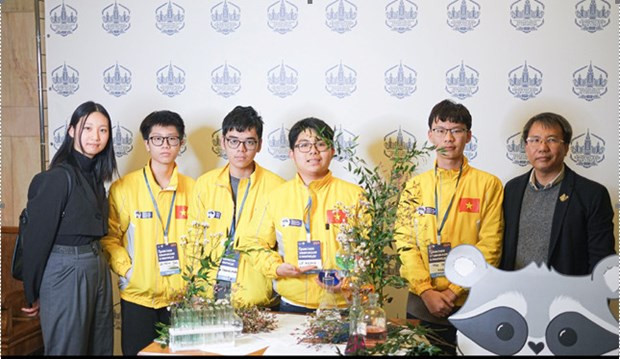
The Vietnamese team at the 2024 Project Chemistry Olympiad in Russia. (Illustrative photo: moet.gov.vn)
PISA, a programme of the Organisation for Economic Cooperation and Development (OECD), measures 15-year-olds’ ability to use their reading, mathematics, and science knowledge and skills to meet real-life challenges. In Vietnam, the 2022 survey covered 6,068 students of 178 schools, representing about 939,500 students aged 15 nationwide.Results show that the average score of Vietnamese students in mathematics, reading comprehension, and science ranked 34th of the 81 countries/economies in the list, and was only second to Singapore among the members of the Association of Southeast Asian Nations (ASEAN).
Vietnam stood at the 31st position among the 81 countries/economies in mathematics, 34th in reading, and 35th in science.
Among the countries sharing a similar socio-economic status, the mathematics score of Vietnamese students was among the highest, only following Hong Kong (China), Taiwan (China), and the Republic of Korea.
The department said the findings indicate that higher spending on education is linked with better results in PISA mathematical performance, but Vietnam is a typical example of high academic results despite limited investment in education.
Education spending for each student aged 6 - 15 was only about 13,800 USD in Vietnam but reached 75,000 USD in OECD economies. However, the average score of Vietnamese students in mathematics was 438 points, one of the highest among the countries/territories with a similar socio-economic status.
Besides, about 13% of students with disadvantaged backgrounds in Vietnam gained high scores in mathematics, compared to the OECD average of 10%, the department elaborated.
It cited the OECD as finding that in mathematics, 72% of Vietnamese students achieved at least Level 2 proficiency, surpassing the OECD average of 69%. Meanwhile, only 5% reached the top performer status (Level 5 or 6), compared to the OECD average of 9%.
About 77% of Vietnamese students achieved Level 2 or higher in reading proficiency, but only 1% reached the top performer status (Level 5 or higher), exceeding the respective OECD averages of 74% and 7%.
In science, 79% of students in the country achieved at least Level 2 proficiency, higher than the OECD average of 76%. However, only 2% secured the top performer status (Level 5 or 6), compared to the average of 7%, the survey revealed.
Vietnam joined in PISA in 2012./.VNA